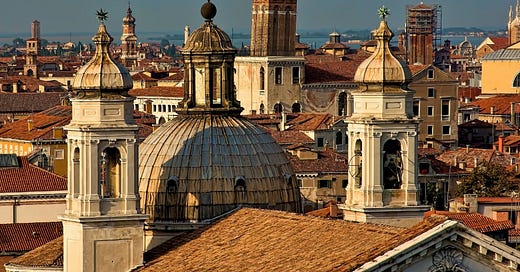Classical Stuff You Should Know recently did an episode on Biblical Hermeneutics. They’re not Catholic,1 so they’re missing a few books, but the general ideas presented are worthwhile.
The reason I thought of this episode is because of today’s first reading. When you’re privately reading scripture, it’s perfectly reasonable to apply the events of the story to your own life. What we shouldn’t do is say that the Bible is about us. And the example they used is, if your parish is fundraising to renovate the church building, you shouldn’t point to the Book of Haggai and say it’s actually a prophesy about adding new tiles to the roof.
Haggai is about the temple, and we can see reflections of that in our own worship, but it’s about us. I highly recommend the episode.
Reading 1
Hg 1:1-8
On the first day of the sixth month in the second year of King Darius, The word of the LORD came through the prophet Haggai to the governor of Judah, Zerubbabel, son of Shealtiel, and to the high priest Joshua, son of Jehozadak:
Thus says the LORD of hosts: This people says: "The time has not yet come to rebuild the house of the LORD."
(Then this word of the LORD came through Haggai, the prophet:) Is it time for you to dwell in your own paneled houses, while this house lies in ruins?
Now thus says the LORD of hosts: Consider your ways! You have sown much, but have brought in little; you have eaten, but have not been satisfied; You have drunk, but have not been exhilarated; have clothed yourselves, but not been warmed; And whoever earned wages earned them for a bag with holes in it.
Thus says the LORD of hosts: Consider your ways! Go up into the hill country; bring timber, and build the house That I may take pleasure in it and receive my glory, says the LORD.
Haggai is interesting in that it’s one of the few books of the Old Testament that has very specific dating. We know the months of the year, because the author keeps referring to Darius the Great, a Persian king for whom we have lots of records.
At this time, the people have returned to their homes in Israel, and they’re starting to get comfortable. But they’ve neglected to rebuild the Temple that was destroyed generations earlier!
It’s not that God needs a Temple to dwell in; it’s that the people need to show gratitude for their deliverance, which came through this foreign king, Darius. Darius had no particular reason to restore the Israelites, on than divine intervention. What does he care if some small tribe of former nomads are in Babylon or Palestine?
But God cares. that’s the land He promised to Abraham and his descendants, and so it shall be, even if He has to do it through a pagan king.
And thus, the need for gratitude. If we don’t remember to thank God for the good things in our life, we begin to lose all sense of justice and right. On the one hand, we might forget how good we have it; on the other, we might start to believe we’re responsible for our own good fortune. Gratitude is a way of keeping our thoughts aligned with God’s.
Responsorial Psalm
Ps 149:1b-2, 3-4, 5-6a and 9b
R. The Lord takes delight in his people.
Sing to the LORD a new song
of praise in the assembly of the faithful.
Let Israel be glad in their maker,
let the children of Zion rejoice in their king.
R. The Lord takes delight in his people.
Let them praise his name in the festive dance,
let them sing praise to him with timbrel and harp.
For the LORD loves his people,
and he adorns the lowly with victory.
R. The Lord takes delight in his people.
Let the faithful exult in glory;
let them sing for joy upon their couches;
Let the high praises of God be in their throats.
This is the glory of all his faithful. Alleluia.
R. The Lord takes delight in his people.
This song was written after the Exodus from Egypt, but like I said in the intro, it can just as easily be applied to the post-exile period, returning from Babylon.
Likewise, we can apply this gratitude to our own lives.
Alleluia
Jn 14:6
R. Alleluia, alleluia.
I am the way and the truth and the life, says the Lord;
no one comes to the Father except through me.
R. Alleluia, alleluia.
“The Way” was an early name for Christianity. It was more than a simple belief, or a set of rules and sacrifices; it is a path we journey on our entire lives.
Gospel
Lk 9:7-9
Herod the tetrarch heard about all that was happening, and he was greatly perplexed because some were saying, "John has been raised from the dead"; others were saying, "Elijah has appeared"; still others, "One of the ancient prophets has arisen." But Herod said, "John I beheaded. Who then is this about whom I hear such things?" And he kept trying to see him.
Here, we have a local subservient ruler,2 rather than a foreign emperor, who hears stories of the God of Israel. Herod wants to know more, but he also harbors doubts. He beheaded John the Baptist, after all.
His instinct isn’t to free the people to worship their God, though. He wants to capture this new revelation, study it, and by learning, control it. Herod doesn’t want to learn about Jesus for God’s sake, but for his own.
We should study the Bible to learn what God is telling us, not to spy out information that will help us in our social or political career. God isn’t a tool for financial gain. God is what we should be seeking, and Jesus is the Way. Everything else is secondary.
Herod Antipas never technically held the title of “king,” because Israel was a vassal state of Rome at this point, in the same way they were under Persia at the time Haggai was written.




